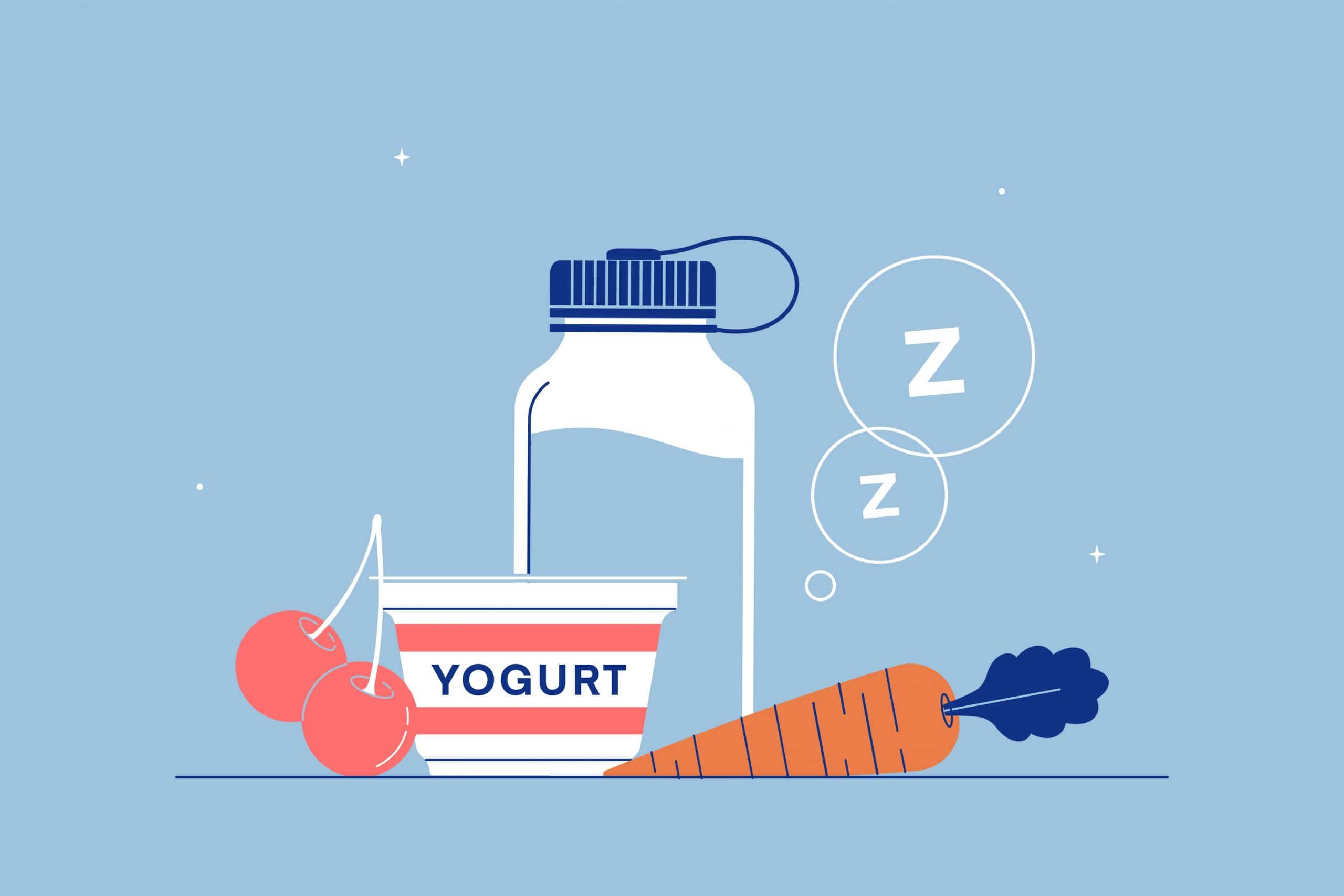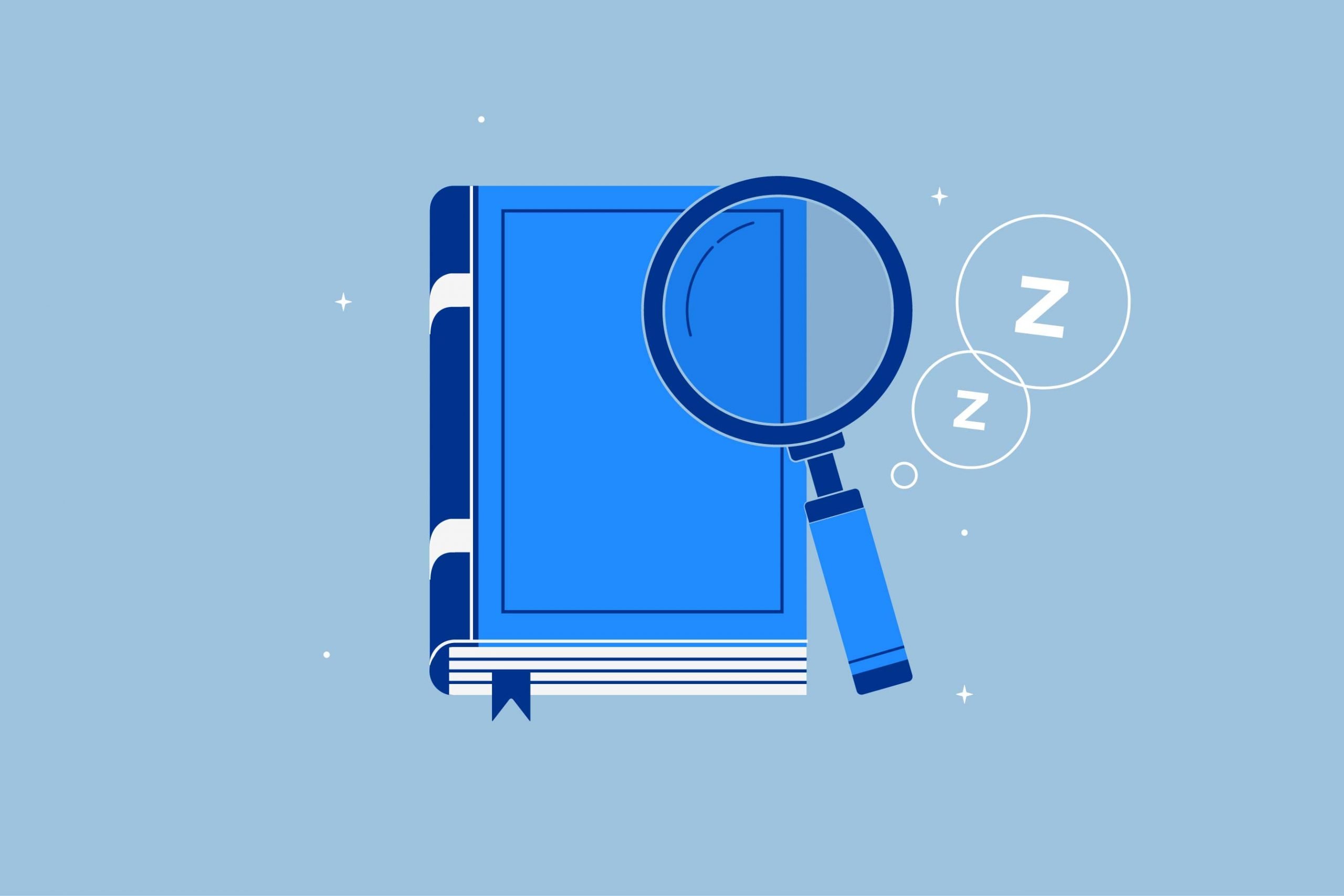Eat your way to more restful sleep with these nutrient-packed superfoods.
When we think about the main things that keep us healthy, like nutrition, sleep, and exercise, it’s easy to envision them as parallel highways, with what we do in one lane having little effect on another.
But, as scientists continue learning about the complex biological processes that keep us running, it’s becoming clear that these roads to health are far more intertwined than we may realize.
Nutrition and sleep are both hot areas of research right now, and recent studies have found that what we eat affects how we sleep, and that in turn, how we sleep can affect what we eat. Clear links between certain foods and nutrients and sleep quality exist, and knowing which foods to include in your diet may help you get better rest.
Eat These Superfoods for Better Sleep
First, let’s take a look at some of the important research regarding sleep and nutrition, and then we’ll cover the top superfoods that support healthy rest.
A recent, large-scale Pennsylvania University study found that people whose diets were low in nutrients like alpha carotene, selenium, lauric acid, and calcium were more likely to have difficulty falling asleep. Diets low in vitamin D, butanoic acid, lauric acid, and lycopene were associated with difficulty staying asleep.
Researchers also linked carbohydrates, vitamin C, potassium, and plain water with sleep troubles. Studies also found that those who consumed lower amounts of calories may have trouble with sleep.
Other research has established that melatonin is part of how our bodies regulate sleep, and that food sources containing melatonin can have some effect on rest. Other minerals like magnesium and zinc Verified Source National Library of Medicine (NIH) World’s largest medical library, making biomedical data and information more accessible. View source have also been found important for healthy rest.
We’ve compiled some of the most nutrient-dense superfoods – all rich sources of nutrients scientifically-proven to offer more restful sleep. See what you should add to your diet for sweeter dreams.
Carrots
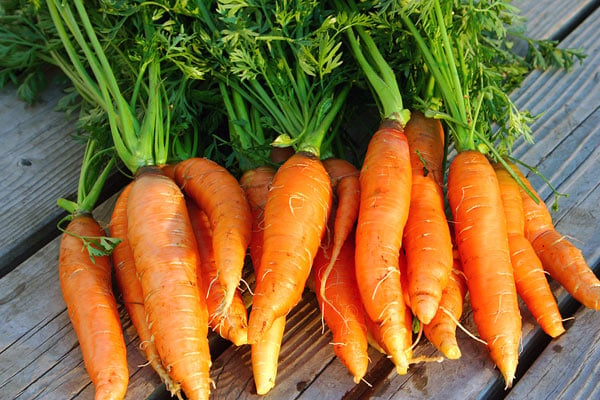
In the Pennsylvania University study mentioned above, they found that consumption of the nutrient alpha-carotene was most closely associated with better sleep. Diets low in this nutrient were linked with trouble falling asleep quickly. Carrots are the most potent sources of alpha-carotene, behind canned pumpkin (per cup cooked).
Canned carrots, carrot juice, raw baby carrots, frozen carrots, and raw regular carrots are all smart sources of this powerful carotenoid. Carrots also pack several other sleep-promoting nutrients like potassium and vitamin B6, as well as vitamin A and biotin.
Montmorency Tart Cherry Juice
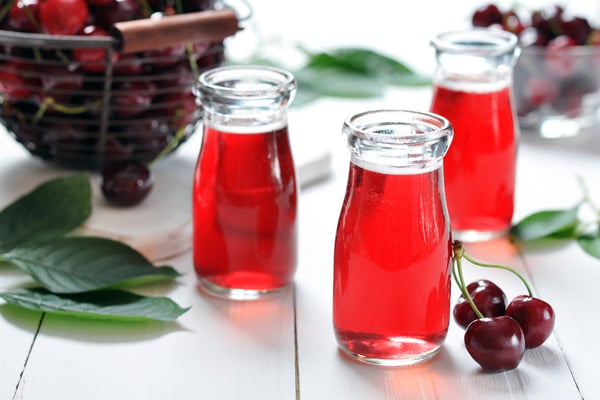
One study reviewed by the Natural Medicine Journal found that Montmorency tart cherry juice increased melatonin levels in participants, resulting in longer sleep duration and improved sleep efficiency. Dosing used in the trials was 30ml (about 1 oz, or 1/8 cup) twice a day: once 30 minutes after waking and then again 30 minutes before the evening meal.
Although tart cherry juice has relatively low levels of melatonin compared to most supplements, other studies have found sleep benefits as well. Some researchers believe that the juice’s antioxidant and anti-inflammatory effects might also play a role in its sleep benefits.
Raw Walnuts
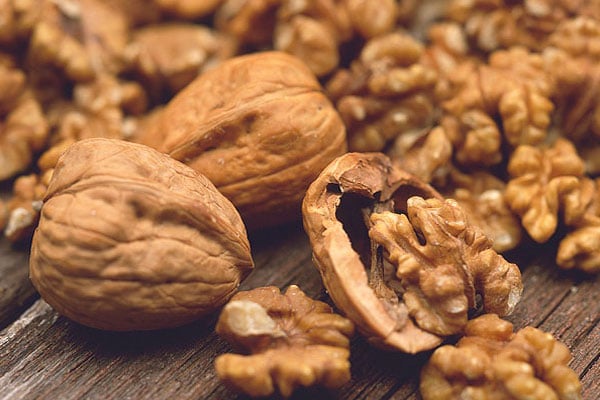
Walnuts are a good source of melatonin, the hormone our “internal clocks” use to regulate sleeping. Researchers at the University of Texas Verified Source National Library of Medicine (NIH) World’s largest medical library, making biomedical data and information more accessible. View source found that rats fed walnuts indeed showed an increase in melatonin levels, which means they may have the same effect in people, too.
The recommended serving size for raw walnuts is about 1 oz or 14 halves. A true superfood, walnuts also pack heart-healthy omega 3’s, unique vitamin E, manganese, and biotin.
Greek Yogurt
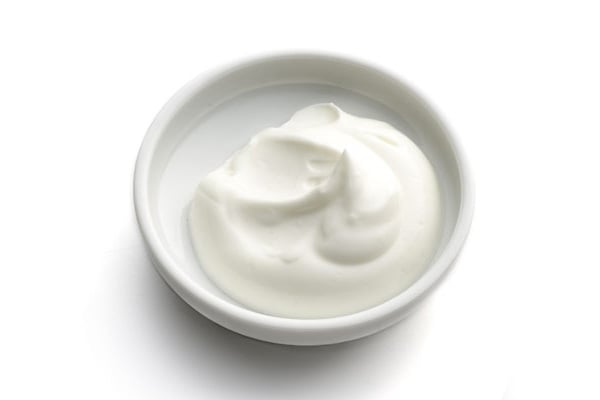
Yogurt’s Greek cousin has been stealing the spotlight recently, and it’s not without just cause. Greek yogurt is a good source of protein, calcium, and vitamin B12, which are helpful for restful sleep. Fortified kinds of yogurts can also be good sources of vitamin D, potassium, and other nutrients.
Yogurt makes a good afternoon or bedtime snack, is easy to keep chilled in a bedroom mini fridge, and you can even combine it with other sleep superfoods like nuts, seeds, fruits, and cocoa for a truly sleep-savvy indulgence.
“For an ultimate sleep-promoting snack, try Greek yogurt with dried tart cherries and granola with walnuts and pumpkin seeds.” recommends dietitian nutritionist Carlene Thomas RDN.
Pumpkin Seeds

In addition to being a beloved cold-weather snack, pumpkin seeds actually double as a sleep superfood! Pumpkin seeds, also known as pepitas, contain 600 mg of tryptophan per 100g as well as good amount of zinc, both of which helps the brain turn tryptophan into serotonin which is the precursor to melatonin.
Pumpkin seeds are also rich in vitamin E, manganese, magnesium, protein, and iron. To get the biggest zinc benefits, eat the whole roasted seeds including the kernel and shell. The recommended serving size is about 1/4 cup.
Mushrooms

Delicious, savory mushrooms boost your sleep with high levels of vitamin D, selenium, and potassium. One cup of mushroom pieces provides around 1/3 of your daily selenium intake, as well as high amounts of vitamins B2 and B3.
Button (aka Portobello/Crimini) mushrooms have also been found to regulate inflammation and to provide protective benefits for your immune and cardiovascular systems. Oyster and shiitake mushrooms also show high levels of immunity-boosting beta-glucans.
Tomatoes
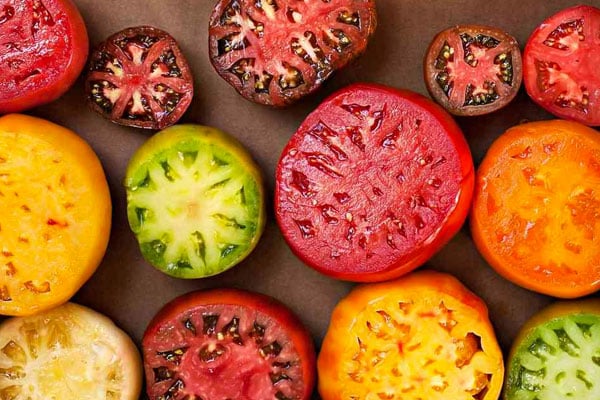
Orange and red tomatoes (especially processed canned and cooked tomatoes) are one of the best sources of lycopene, a mineral important for sleep. Lycopene, a potent antioxidant, has also been associated with heart and bone health.
Tomatoes are also good sources of potassium, vitamin C, biotin, vitamin K, and manganese, so pile on the marinara and sip some tomato juice!
Salmon

Fish is the sleep superfood of the protein especially varieties containing omega-3’s like salmon Salmon offers several heart, eye, joint and brain benefits, and may also help with healthy cholesterol and blood pressure. Omega 3’s can help adults improve sleep quality and length.
One 4-ounce serving of wild salmon packs over 236% of the recommended daily intake of vitamin B12, over 127% of vitamin D, 78% of selenium, and over half the RDI for vitamin B3 and omega-3 fats.
Virgin Coconut Oil
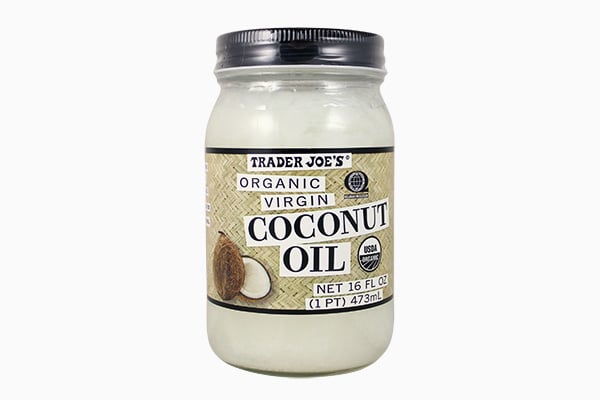
Coconut oil has been making big waves for a while now as a trendy “health” food. Coconut oil contains high amounts of dodecanoic acid (aka lauric acid), which has been linked with more restful sleep.
About 50% of virgin coconut oil is lauric acid, and it also contains antioxidant phenolic compounds.
Kale
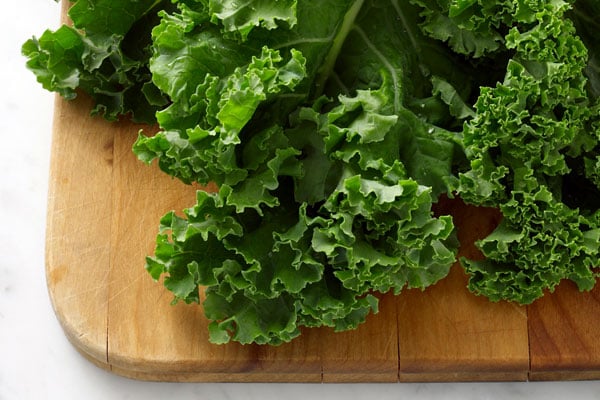
Kale continues to be one of the more popular greens at the grocery and it also happens to be a good thing for sleep! Touted as one of the most nutrient-dense foods on the planet, kale is literally packed with vitamins and minerals that support sleep and health in general.
One cup of chopped kale contains 10% RDI of vitamin B6, plus good amounts of potassium, calcium, and magnesium. In addition to these sleep-supporting nutrients, kale also packs massive amounts of vitamins K, A, and C, and even small amounts of iron and omega-3s.
Bonus: Pure, Plain Water

While water doesn’t count as a food, per se, pure water is still important for sleep. People that did not consume an adequate amount of plain water were more likely to have sleep difficulties in the Penn State study mentioned earlier.
But don’t go too crazy with the water in the evening! It’s best to balance your water intake earlier in the day though so your bladder doesn’t wake you at night from drinking water before bed.
To get the most out of these sleep-boosting foods, try combining several for healthy meals. Here are a few super-meal ideas to eat before bed for more restful sleep:
- Greek yogurt with walnuts, pumpkin seeds, and fruit.
- Marinara sauce or cacciatore with tomatoes, carrots, and mushrooms.
- Salmon roasted in coconut oil with sautéed kale.
- Carrot cardamom rice pudding with walnuts and seeds.
- Chicken soup with tomatoes, mushrooms, and kale.
If you don’t want to throw together a snack, you could try a protein shake before bed. This can be a quick way to feel more full before bed.
Incorporate these superfoods into a balanced diet, along with regular exercise and good sleep hygiene, and you can achieve restful sleep naturally and get healthier in the process!
What are your favorite superfoods? Are there any other foods you find help you sleep better?
About the author
Rosie Osmun, a Certified Sleep Science Coach, brings a wealth of knowledge and expertise to the health and wellness industry. With a degree in Political Science and Government from Arizona State University College of Liberal Arts and Sciences, Rosie's academic achievements provide a solid foundation for her work in sleep and wellness. With over 13 years of experience in the beauty, health, sleep, and wellness industries, Rosie has developed a comprehensive understanding of the science of sleep and its influence on overall health and wellbeing. Her commitment to enhancing sleep quality is reflected in her practical, evidence-based advice and tips. As a regular contributor to the Amerisleep blog, Rosie specializes in reducing back pain while sleeping, optimizing dinners for better sleep, and improving productivity in the mornings. Her articles showcase her fascination with the science of sleep and her dedication to researching and writing about beds. Rosie's contributions to a variety of publications, including Forbes, Bustle, and Healthline, as well as her regular contributions to the Amerisleep blog, underscore her authority in her field. These platforms, recognizing her expertise, rely on her to provide accurate and pertinent information to their readers. Additionally, Rosie's work has been featured in reputable publications like Byrdie, Lifehacker, Men's Journal, EatingWell, and Medical Daily, further solidifying her expertise in the field.
View all posts